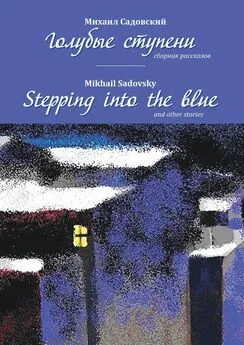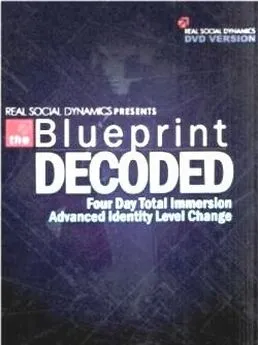Mikhail Sadovsky - Голубые ступени / Stepping into the blue
- Название:Голубые ступени / Stepping into the blue
- Автор:
- Жанр:
- Издательство:неизвестно
- Год:неизвестен
- ISBN:9785005321114
- Рейтинг:
- Избранное:Добавить в избранное
-
Отзывы:
-
Ваша оценка:
Mikhail Sadovsky - Голубые ступени / Stepping into the blue краткое содержание
Голубые ступени / Stepping into the blue - читать онлайн бесплатно ознакомительный отрывок
Интервал:
Закладка:
– Ну, бабушка, садись! – хохотнул рабочий, и они вдвоём с Филиппычем усадили старуху в кузов через низенький бортик.
– К конторе! – распорядился Филиппыч и последовал за ними.
Старуха так и дожидалась, сидя на рогоже, пока он подойдёт и снова поможет ей выбраться на землю. Потом они долго решали, что делать, и она наотрез отказалась ехать на такси, а только просила проводить её до автобуса. После долгих уговоров она согласилась, что Филиппыч довезёт её до троллейбуса – это ему по дороге, а там уж она сама.
– Внук всё записать за мной мою жизнь хочет, – рассказывала она, пока ехали, – а я ему говорю, что толку нет – все мы одинаково жили, ничего особенного, а то, что мне довелось больше других на свете остаться, так это ещё неизвестно – повезло ли.
– Да! – вздохнул Филиппыч и оглянулся. – А вам больше семидесяти не дашь. Не обманываете?
– Зачем? – удивилась старуха. – Ты представь только – я ж ещё при Александре родилась, в черте оседлости!
– А это что такое?
– Что такое? А за ёр аф мир! Что такое? Черта для евреев была.
– Какая?
– Где жить – где не жить!
– Граница, что ли?
– Видно, правда, надо соглашаться мне…
– Чего?
– Да рассказывать! Если такие молодые люди ничего не знают… ты хоть учился где?
– Бауманский закончил, – похвалился Филиппыч.
– Это что же такое?
– Инженером был!
– Инженер – заведует кладбищем!
– Гелт, – просто ответил Филиппыч.
– Ты что, разве а ид? – удивилась старуха.
– Я нормальный. Что, одни евреи умные?! – обиделся Филиппыч. – Неужели всё помните?
Старуха долго не отвечала, так что водитель уже стал беспокоиться и оглянулся назад через плечо.
– Я такое помню, что лучше забыть, – тихо сказала она. – Раньше за это сажали. Теперь всё равно не напечатают. Зачем ему трепать нервы? Пусть это уйдёт со мной. Он же не виноват, что я его бабка…
– Знаете что? Я вас довезу до дома. Куда вы в такую темень и с такими ногами…
– Нет, – возразила старуха. – Я должна сама домой вернуться. Так надо. Мне надо и Ему…
Филиппыч не понял, кому «ему», но уточнять не стал. Он высадил её на остановке, помог забраться в троллейбус и ещё долго стоял, переваривая произошедшее с ним и завидуя неизвестному внуку. У него-то не было стариков – одни лежали в земле далеко на западе, другие далеко на востоке, и никто не мог даже сказать ему, где их могилы.
Ninety
[ Devianosto ]
Ninety is ninety. The number all by itself may always have an empty ring about it, but when your grandmother is ninety and she calls you «little boy» and you’re forty, well, that’s something to think about. Just think of how much is wrapped up in that one little number!
«So, maybe you won’t be going to the synagogue today? Look at the weather!»
«That’s no matter. Why should I care about the weather? At my age I can’t afford to stop going. I haven’t missed once yet, so why should I take a holiday today? Ever since it became dangerous to go to the synagogue, I haven’t missed a single time! Even when the men were afraid to go, I still went!»
«And you weren’t afraid?»
«What would they do to me? Somebody has to go to the synagogue. Else they could say that now nobody goes there it isn’t needed any more. Something about that you don’t understand?»
«Grandma, what an advanced social consciousness you have. Wow! So, you asked Him not to let them close the synagogue?»
«I’ve never asked anything. I certainly don’t have to ask Him anything.»
«But everybody asks Him! The Russians in their churches, the Tatars in their mosques, and the Jews…»
«No. There’s nothing that needs asking for. I tell Him what the situation is so that He’ll know the truth. And He Himself knows what to do.»
«And how do you plan to get yourself up those stairs?»
«That’s no matter. Little by little. But the closer I get to Him, the better He’ll hear me. I don’t exactly shout, you know. I could even tell it all to Him right here, He’d still hear me. But I think He’s pleased that I’ve been going to the synagogue all these years.»
«Everything’s all the same, it’s all the same.»
«Little one, the sun too rises and sets, and people are born and die, and money comes and goes. When you get older, you’ll understand.»
«What do you mean, Grandma? I’m already forty!»
«It’s not that you’re forty, it’s that I’m ninety. I never have asked Him. It happened once that – a verbrennen soll alts wern… das ich hab gemeint… du verstehst, du verstehst alts – und ich hab gerechnet – das ist ein sof (I should let it all all burn up … that’s what I thought… you understand, you understand it all, and I decided then that this was the end). But He decided otherwise.»
« Bobei, meine teure Bobei! Ich bet dir, leb noch ein hundert jahr! (Grandma, my dear Grandma! I beg you, live a hundred years more!)»
«Oh, you’re tricky! Yeshefitcha (A real sweetikins)! You still want to be young! No, no, enough about that. I still won’t go in your car. But if you change a rouble for me and give me ten-kopeck pieces, I can give out some money to everyone as they walk out.»
Little by little she got herself ready. She deposited the change from the rouble into a ragged little purse with a button in the middle. Another purse, a little larger and fatter, was dropped into the pocket of a long black skirt. Then she pulled on an old but still quite respectable overcoat which barely covered her skirt (though it wasn’t a dirty-looking coat like the ones most women her age wore). After checking her keys, she took out a home-made juniper walking-stick, a very nice one with a long curved handle, on which she could even support herself with one elbow, and set foot out the door.
She had turned ninety two months ago. There was no fancy celebration. But all the neighbors somehow found out about it and came round. They rang the doorbell and offered their congratulations, even though they could have done this on the street. But still they came. She hadn’t really been close friends with them, the neighbors, but whenever she learned that someone was ill, she invariably went over and simply extended her help without even asking whether the help was required. She had done this even as a young woman. She had been living in this same spot for several decades already.
She wasn’t afraid to ring anyone’s bell. Their husbands had all been taken away by the secret police. And where both parents had been taken, she wasn’t afraid to go and feed the children that had been left behind. And when disaster befell her, and nobody rang the doorbell, and when people saw her on the street, and would simply cross to the other side and not say hello so as not to make trouble, 12 12 During the Stalinist period it was considered a citizen’s duty to avoid all contact with relatives of a declared ’enemy of the people’.
she didn’t take offense. People were people, after all. Some lived one way, some another.
«How old was I then? Sixty? Well, what is there to be afraid of at sixty? I didn’t know then I’d be alive at ninety!»
She didn’t like remembering everything all at once, which she considered tanatamount to «throwing everything together in a heap», but if she happened to recall something, she would remember it in such detail as though it had occurred just a few moments ago and she were simply explaining the scene to a blind person so that he would know what was going on.
And then at every opportunity she would tell Him the story too, not necessarily about herself, but today was special, and after her account she allowed herself to ask: « Gotteniu, du bist hat nicht vergessen – ich hab doch allein geblieben? Gotteniu, ich bet dir, nicht vergess uben mir. Ich nur dermahn dir. (Lord, you haven’t forgotten about me – am I the only one left here? Lord, I beg you, don’t forget about me. Just reminding you!)»
On the steps of the synagogue near the exit she handed out the ten-kopeck pieces from her purse, saying « Seit gesund! Seit gesund! (Be healthy! Be healthy!)» and shuffled up the hill to the bus stop. She had a long journey ahead of her, but she knew the way quite well, and, what’s more, she knew she would get there for certain. First a trolleybus ride, then it was on to the subway with one transfer, and finally another bus ride – about two hours altogether one-way.
At the gates to the cemetery she stopped to catch her breath and look about her. There was someone she needed to visit here. She stood still for five minutes or so and then headed down the central allée – she was getting close now. At the familiar little gate she undid the cord fastener and entered the low-fenced enclosure. After placing two fir boughs on the grave, bushy side up, she wiped the enamelled photograph on the headstone with the palm of her hand, put her face up close to it, wiped it once again, then kissed it and took her seat once more on the damp black bench.
« Khaint ich hab do mit dir, Ziama. Du bist hat nicht vorgessen was vor ein Tag khaint? Nein, ich gleib dir, nein! (Today I’m here with you, Ziama. You haven’t forgotten what day it is today. No, I’m sure you haven’t!)»
Passers-by naturally might have surmised that here was just a crazy old woman talking to herself. Somebody might have thought she was saying a prayer. In fact, she was simply talking with her husband.
«It was a cloudy day back then too, and you were in a hurry, as always, and I had to get to the village. We never had time to be together back then. Still, thank God, we lived fifty-six years together, if you count the eighteen you spent in prison. But of course they count! If we hadn’t been waiting for each other all those years, we might not have survived.
«It didn’t work out with the children, because of that. If we had had four or five, you wouldn’t have minded! I should say not! I know you! You were happy about that. But thank God He gave us two. We pulled through! You were either fighting or building, or in prison. And when you came back, I was oh so many years older – we won’t even count them.
Читать дальшеИнтервал:
Закладка:










